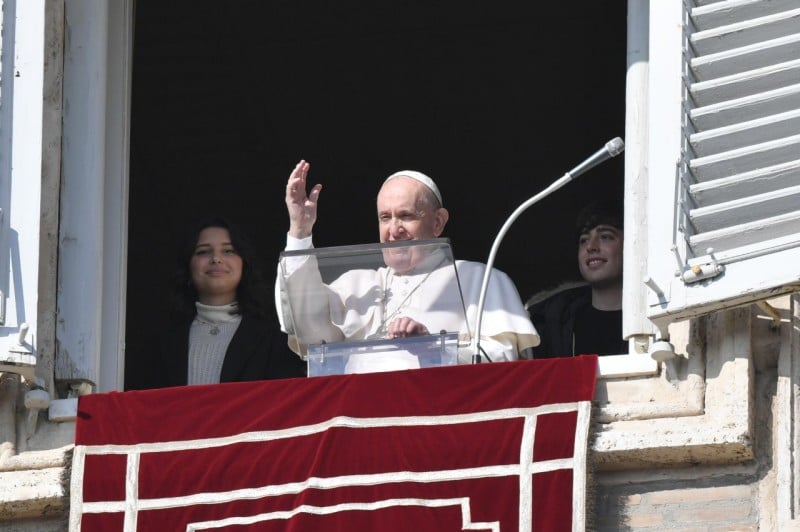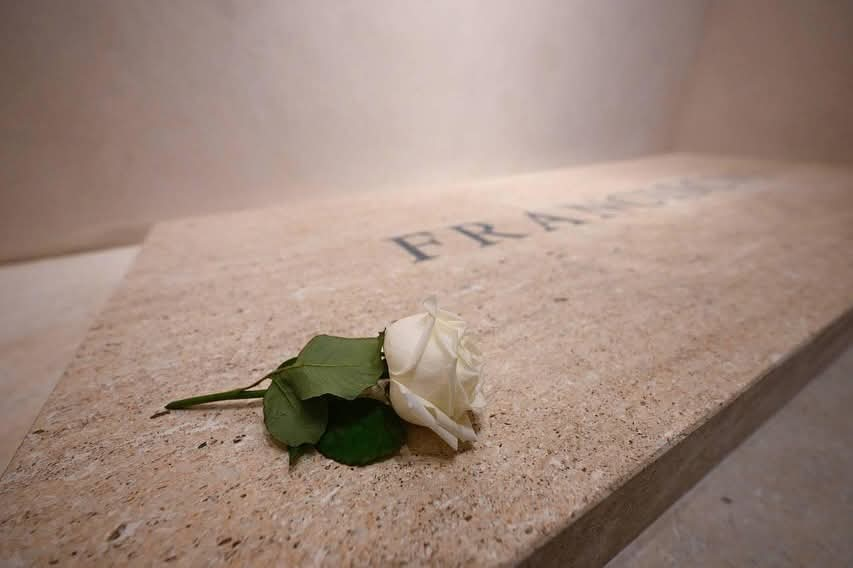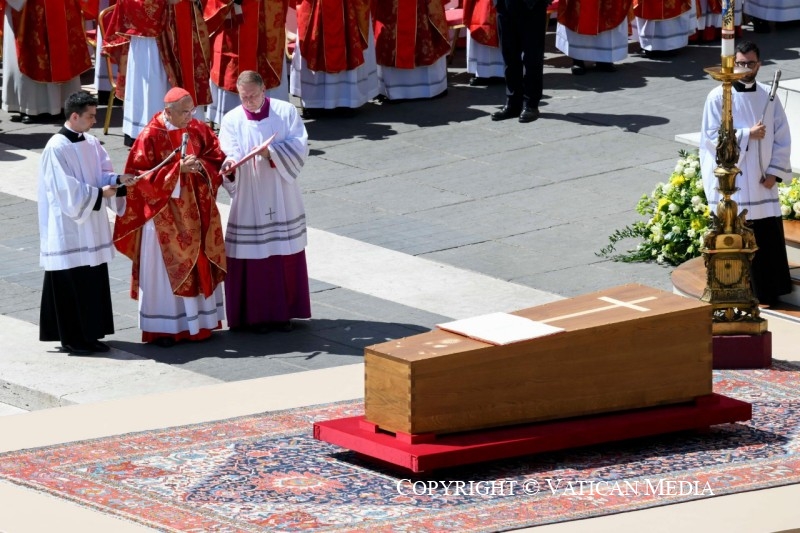Angelus: Jesus Says ‘I Am King’
'Kingship of Jesus is Completely Different than that of the World'

Jesus said “I am King” but “the kingship of Jesus is completely different than that of the world.”
Pope Francis gave the faithful this reminder in his words before praying the noonday Angelus today in St. Peter’s Square. On the Feast of Christ the King, the Holy Father recalled Christ’s courage and determination when brought before Pilate, a crowd called for his crucifixion.
“Let us reflect on this: in front of Pilate, Christ says he is a king at the moment in which the crowd is against Him; but when the crowd was following and acclaiming him, he remained distant from this acclamation,” the Pope said. “That is, Jesus is showing that he is sovereignly free from the desire of earthly fame and glory.
“And we – let us ask ourselves – do we know how to imitate him in this aspect? Do we know how to govern our tendency to be continuously sought after and approved, or do we do everything to be esteemed by others? So, I ask: what matters? Is it applause or service that matters about what we do, particularly concerning our Christian commitment?”
The Holy Father reminded those listening in the square and around the world via media: “The truth of Jesus is not an idea, something abstract: the truth of Jesus is a reality, it is He himself who made the truth within us that frees us from the fabrications and falsity that we have inside, from doublespeak. Being with Jesus, we become true.”
Following is the Holy Father’s full Angelus commentary, provided by the Vatican:
Dear brothers and sisters, Buongiorno!
The Gospel from today’s liturgy, the last Sunday of the Liturgical Year, ends with an affirmation made by Jesus who says: “I am a king” (Jn 18:37). He pronounces these words in front of Pilate, while the crowd shouts out that he be condemned to death. He says: “I am a king”, and the crowd cries out that he be condemned to death. Quite a contrast. The crucial hour has come. Previously, it seems that Jesus had not wanted the people to acclaim him as king: we recall that time after the multiplication of the loaves and fish when he withdrew by himself to pray (cf. Jn 6:14-15).
The fact is that the kingship of Jesus is completely different than that of the world. “My kingship”, he says to Pilate, “is not of this world” (Jn 18:36). He did not come to dominate but to serve. He did not come amid signs of power, but with the power of signs. He was not dressed with precious insignia, but he was naked on the cross. And it was precisely through the inscription placed on the cross that Jesus came to be defined as “king” (cf. Jn 19:19). His kingship is truly beyond human parameters! We could say that he is not like other kings, but he is a King for others. Let us reflect on this: in front of Pilate, Christ says he is a king at the moment in which the crowd is against Him; but when the crowd was following and acclaiming him, he remained distant from this acclamation. That is, Jesus is showing that he is sovereignly free from the desire of earthly fame and glory. And we – let us ask ourselves – do we know how to imitate him in this aspect? Do we know how to govern our tendency to be continuously sought after and approved, or do we do everything to be esteemed by others? So, I ask: what matters? Is it applause or service that matters about what we do, particularly concerning our Christian commitment?
Jesus not only fled from seeking any earthly greatness, but he also makes the hearts of those who follow him free and sovereign. Dear brothers and sisters, he frees us from being subject to evil. His Kingdom is liberating, there is nothing oppressive about it. He treats every disciple as a friend, not as a subject. Even while being above all sovereigns, he draws no dividing line between himself and others. Instead, he wants to have brothers and sisters with whom to share his joy (cf. Jn 15:11). We do not lose anything in following him – nothing is lost, no – but we acquire dignity because Christ does not want servility around him, but people who are free. And – we can ask ourselves now – from whence does Jesus’ freedom derive? We discover that by returning to the affirmation he made in front of Pilate: “I am a king. For this I was born, and for this, I have come into the world: to bear witness to the truth” (Jn 18:37).
Jesus’ freedom derives from the truth. It is truth that makes us free (cf. Jn 8:32). But the truth of Jesus is not an idea, something abstract: the truth of Jesus is a reality, it is He himself who made the truth within us that frees us from the fabrications and falsity that we have inside, from doublespeak. Being with Jesus, we become true. The life of a Christian is not a play in which you can don the mask that best suits you. For when Jesus reigns in the heart, he frees it from hypocrisy, he frees it from subterfuge, from duplicity. The best proof that Christ is our king is detachment from what pollutes life, makes it ambiguous, opaque, sad. When life is ambiguous – a bit here and there – it is sad, very sad. We must always face our limitations and defects, of course: we are all sinners. But when we live under the lordship of Jesus, we do not become corrupt, we do not become false, inclined to cover up the truth. We do not live double lives. Remember this well: all of us are sinners, yes; corrupt, never, never. Sinners, yes; corrupt, never. May the Madonna help us to seek every day the truth of Jesus, King of the Universe, who liberates us from earthly slavery and teaches us to govern our vices.
______________________________________
After the Angelus, the Holy Father continued:
Today, for the first time on the Solemnity of Christ the King, World Youth Day is being celebrated in all the particular Churches. This is why there are two young people from Rome beside me, representing all the young people of Rome. I cordially greet the young boys and girls from our Diocese, and I hope that all the young people in the world might feel that they are a living part of the Church, protagonists of her mission. Thank you for coming! And do not forgive that to reign is to serve. What was that? To reign is to serve. All together: to reign is to serve. Just like our King teaches us. Now I ask these young people to greet you. Say something [he says to the young woman].
Young woman: Happy World Youth Day to all of you!
Pope: Say something creative [to the young man].
Young man: Let us testify that believing in Jesus is beautiful!
Pope: See that! This is beautiful! Thank you. Remain here [to the two young people].
Today is also World Fisheries Day. I greet all fishermen and I pray for those living in difficult conditions, unfortunately, some things in forced labor. I encourage the chaplains and volunteers of Stella Maris to continue their pastoral service to these people and their families.
And today we also remember all road traffic victims: we pray for them and we commit ourselves to prevent accidents.
I would also like to encourage the United Nations’ initiatives currently underway toward achieving greater control over the arms trade.
Yesterday in Katowice, in Poland, Jan Franciszek Macha was beatified, killed in hatred of the faith in 1941 within the context of the persecutions against the Church during the Nazi regime. In the darkness of his prison, he found in God the strength and meekness to face that calvary. May his martyrdom be a fruitful seed of hope and peace. A round of applause for the new Blessed.
I greet all of you, members of the faithful from Rome and pilgrims from various countries, in particular those who have come from Poland and the United States of America. I greet the scouts from the Archdiocese of Braga in Portugal. In a special way, I greet the Ecuadorian community of Rome who is celebrating the Virgin of El Quinche. I greet the faithful from Sant’Antimo (Naples) and from Catania; the Confirmation candidates from Pattada; and the Food Bank (Banco Alimentari) volunteers who are preparing for next Saturday’s National Food Collection Day (Giornata della colletta alimentare). Many thanks! And also to members of the Immacolata. I wish all of you a good Sunday. And please, do not forget to pray for me. Enjoy your meal and arrivederci!
© Libreria Editrice Vatican
Related

Cardinal Parolin at the Novendalia Mass: “Mercy leads us to the heart of faith”
Exaudi Staff
27 April, 2025
8 min

Pope Francis’ Tomb in Santa Maria Maggiore
Exaudi Staff
27 April, 2025
1 min

Mercy and the joy of the Gospel are two key concepts of Pope Francis
Exaudi Staff
26 April, 2025
9 min

Thousands of faithful bid farewell to Pope Francis in St. Peter’s Square
Exaudi Staff
26 April, 2025
2 min
 (EN)
(EN)
 (ES)
(ES)
 (IT)
(IT)

